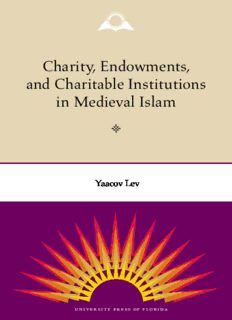
Charity, Endowments, and Charitable Institutions in Medieval Islam PDF
Preview Charity, Endowments, and Charitable Institutions in Medieval Islam
Charity, Endowments, and Charitable Institutions in Medieval Islam g Yaacov Lev university press of florida Charity, Endowments, and Charitable Institutions in Medieval Islam Florida A&M University, Tallahassee Florida Atlantic University, Boca Raton Florida Gulf Coast University, Ft. Myers Florida International University, Miami Florida State University, Tallahassee New College of Florida University of Central Florida, Orlando University of Florida, Gainesville University of North Florida, Jacksonville University of South Florida, Tampa University of West Florida, Pensacola Charity, Endowments, and Charitable Institutions in Medieval Islam Yaacov Lev University Press of Florida Gainesville/Tallahassee/Tampa/Boca Raton Pensacola/Orlando/Miami/Jacksonville/Ft. Myers/Sarasota Copyright 2005 by Yaacov Lev Printed in the United States of America on recycled, acid-free paper All rights reserved A record of cataloging-in-publication data is available from the Library of Congress. ISBN 978-0-8130-3589-5 The University Press of Florida is the scholarly publishing agency for the State University System of Florida, comprising Florida A&M University, Florida Atlantic University, Florida Gulf Coast University, Florida International University, Florida State University, New College of Florida, University of Central Florida, University of Florida, University of North Florida, University of South Florida, and University of West Florida. University Press of Florida 15 Northwest 15th Street Gainesville, FL 32611-2079 http://www.upf.com This book is dedicated to the memory of Simha Sabari (1916–2004), my men- tor and teacher of classical Arabic and medieval Islamic history during my undergraduate and postgraduate studies at Tel Aviv University, 1968–74. In this age of narrow specialization she brought broad vision and humanistic values, moving freely between Abbasid belles lettres, the palaces and streets of medieval Baghdad, and social history of Mandatory Palestine. Her approach was humanistic, marked by great empathy for the people whose lives and deeds she had studied. Her teaching and work (Mouvements populaires à Bagdad à l’époque abbasside IXe-XIe siècles [Paris, 1981]) are a constant source of in- spiration. It is a great pity that her work about the labor movement in Manda- tory Palestine was never published but it served some of her postgraduate students as well as other scholars. Contents Preface and Acknowledgments ix Introduction 1 1. Charity, Society, and the State 4 2. Charity, Piety, and Politics 21 3. Charity and Pious Endowments 53 4. Pious Endowments and the Urban Society 68 5. Pious Endowments, Learning, and Mysticism 85 6. Charitable Institutions and Causes 113 7. The Wider Context of Islamic Charity 144 Notes 161 Bibliography 193 Index 209 Preface and Acknowledgments This book is a study into the religious beliefs of medieval men, their social practices, and the institutions they created that shaped their lives and conduct. Although medieval Islam is the primary framework of this inquiry, much of what follows also applies to the Jewish and Christian worlds. The notion of charity (Arabic sadaqa, Hebrew tsedaqa), in the most basic sense of giving, is deeply embedded in the religious thought and ethics of the three monotheistic religions and was central to the lives of medieval Jews, Muslims, and Chris- tians. It represented the essence of their piety and quest for nearness to God. In recent years, the study of medieval Islamic charity has been advanced by a great proliferation of studies into the Islamic institution of pious endowment (waqf). The Islamic pious endowment system was a remarkable institution that embodied not only the religious beliefs of the founder of the endowment but also his altruism and his desperate attempt to defend his property and interests. Although, like many other institutions, the waqf system functioned quite well, it was also susceptible to widespread abuse. We owe much of our understand- ing of the waqf institution to the work of Muhammad Muhammad al-Amin, whose book on pious endowments and social life in medieval Egypt is a land- mark in the field of Islamic social history, as is his extensive publication of pious endowment deeds, which opened new vistas for research. Students of medieval Islamic history also owe an immeasurable debt to the scholars who were behind two scholarly undertakings: the Corpus Inscriptionum Arabi- carum and the Répertoire chronologique d’épigraphie arabe. Most of the epi- graphic data used in this study is drawn from these two works, which corrobo- rate information derived from other sources and provide new data and fresh insights. The need to integrate the study of charity into a wider context of economic history and the history of poverty is obvious. The economic history of medieval and Ottoman Islam is an advanced field of study, but any attempt to correlate salaries and charitable expenditures quoted in pious endowment deeds with wider trends that reflected monetary changes is problematic. Frequently, the results obtained are too fragmentary to provide any meaningful picture, and this type of study is also hampered by the fact that the economic aspects of charity are rarely referred to in the literary sources. Nonetheless, future re- search, perhaps conducted on a narrower local scale, should be carried out before any broader generalizations are attempted. In this work, poverty and
Description: